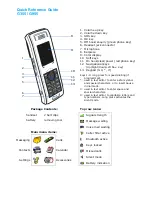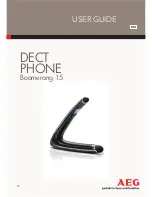
Important Safety Information
90
Important Safety Information
This phone guide contains important operational and safety information that will help you safely
use your phone. Failure to read and follow the information provided in this phone guide may
result in serious bodily injury, death, or property damage.
General Precautions
There are several simple guidelines to operating your phone properly and maintaining safe,
satisfactory service.
● To maximize performance, do not touch
the portions
of your phone where the internal
antenna
s are
located while using the phone.
● Speak directly into the mouthpiece. Avoid exposing your phone and accessories to rain
or liquid spills. If your phone does get wet immediately turn the power off and remove the
battery.
● Do not expose your phone to direct sunlight for extended periods of time (such as on the
dashboard of a car).
● Although your phone is quite sturdy, it is a complex piece of equipment and can be
broken. Avoid dropping, hitting, bending, or sitting on it.
● Any changes or modifications to your phone not expressly approved in this document
could void your warranty for this equipment and void your authority to operate this
equipment.
● Authorized personnel should service your phone and accessories. Failure to do so may
be dangerous and void your warranty.
Maintaining Safe Use of and Access to Your Phone
Do Not Rely on Your Phone for Emergency Calls
Mobile phones operate using radio signals, which cannot guarantee connection in all conditions.
Therefore you should never rely solely upon any mobile phone for essential communication
(e.g., medical emergencies). Emergency calls may not be possible on all wireless networks or
when certain network services or mobile phone features are in use. Check with your local
service provider for details.
Using Your Phone While Driving
Using your phone while driving (or operating the phone without a hands-free device) is
prohibited in certain jurisdictions. Laws vary as to specific restrictions. Remember to focus on
driving first.
















































